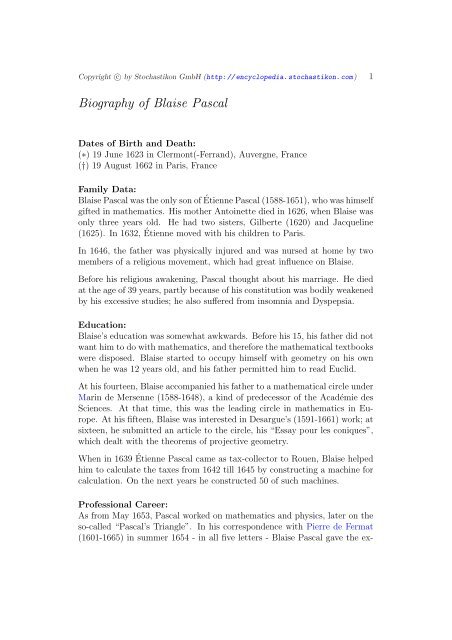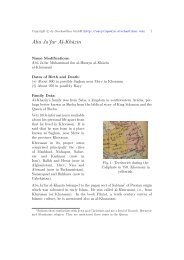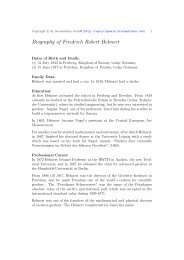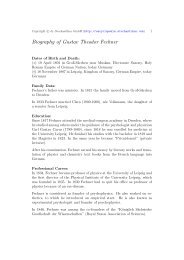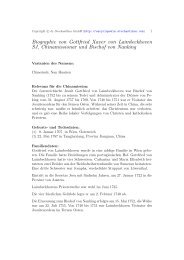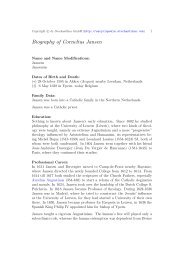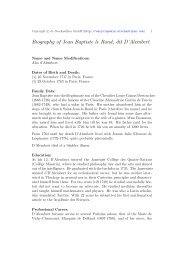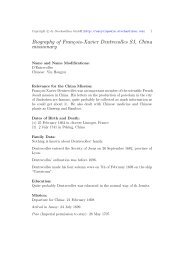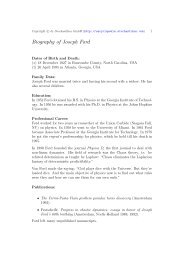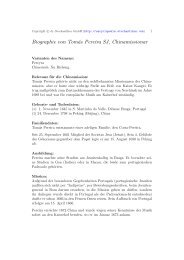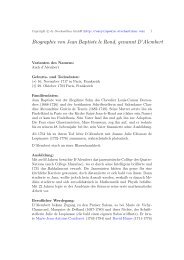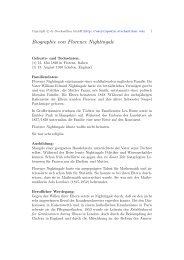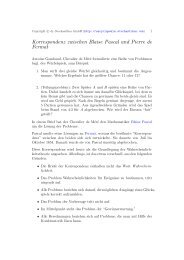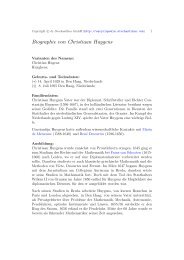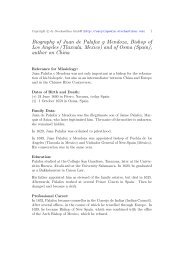Biography of Blaise Pascal
Biography of Blaise Pascal
Biography of Blaise Pascal
Create successful ePaper yourself
Turn your PDF publications into a flip-book with our unique Google optimized e-Paper software.
Copyright c○ by Stochastikon GmbH (http://encyclopedia.stochastikon.com) 1<br />
<strong>Biography</strong> <strong>of</strong> <strong>Blaise</strong> <strong>Pascal</strong><br />
Dates <strong>of</strong> Birth and Death:<br />
(∗) 19 June 1623 in Clermont(-Ferrand), Auvergne, France<br />
(†) 19 August 1662 in Paris, France<br />
Family Data:<br />
<strong>Blaise</strong> <strong>Pascal</strong> was the only son <strong>of</strong> Étienne <strong>Pascal</strong> (1588-1651), who was himself<br />
gifted in mathematics. His mother Antoinette died in 1626, when <strong>Blaise</strong> was<br />
only three years old. He had two sisters, Gilberte (1620) and Jacqueline<br />
(1625). In 1632, Étienne moved with his children to Paris.<br />
In 1646, the father was physically injured and was nursed at home by two<br />
members <strong>of</strong> a religious movement, which had great influence on <strong>Blaise</strong>.<br />
Before his religious awakening, <strong>Pascal</strong> thought about his marriage. He died<br />
at the age <strong>of</strong> 39 years, partly because <strong>of</strong> his constitution was bodily weakened<br />
by his excessive studies; he also suffered from insomnia and Dyspepsia.<br />
Education:<br />
<strong>Blaise</strong>’s education was somewhat awkwards. Before his 15, his father did not<br />
want him to do with mathematics, and therefore the mathematical textbooks<br />
were disposed. <strong>Blaise</strong> started to occupy himself with geometry on his own<br />
when he was 12 years old, and his father permitted him to read Euclid.<br />
At his fourteen, <strong>Blaise</strong> accompanied his father to a mathematical circle under<br />
Marin de Mersenne (1588-1648), a kind <strong>of</strong> predecessor <strong>of</strong> the Académie des<br />
Sciences. At that time, this was the leading circle in mathematics in Europe.<br />
At his fifteen, <strong>Blaise</strong> was interested in Desargue’s (1591-1661) work; at<br />
sixteen, he submitted an article to the circle, his “Essay pour les coniques”,<br />
which dealt with the theorems <strong>of</strong> projective geometry.<br />
When in 1639 Étienne <strong>Pascal</strong> came as tax-collector to Rouen, <strong>Blaise</strong> helped<br />
him to calculate the taxes from 1642 till 1645 by constructing a machine for<br />
calculation. On the next years he constructed 50 <strong>of</strong> such machines.<br />
Pr<strong>of</strong>essional Career:<br />
As from May 1653, <strong>Pascal</strong> worked on mathematics and physics, later on the<br />
so-called “<strong>Pascal</strong>’s Triangle”. In his correspondence with Pierre de Fermat<br />
(1601-1665) in summer 1654 - in all five letters - <strong>Blaise</strong> <strong>Pascal</strong> gave the ex-
Copyright c○ by Stochastikon GmbH (http://encyclopedia.stochastikon.com) 2<br />
planatory statement about the theory <strong>of</strong> probability. He wrote about the<br />
practical problem <strong>of</strong> a gambler, how to finish a game <strong>of</strong> chance without victory<br />
or defeat so that both gamblers can divide the bet justly. With the<br />
throw <strong>of</strong> the dice and their spots Luca Pacioli OFM (1445-1514), Niccolò<br />
Fontana Tartaglia (1499-1557) and Girolamo Cardano (1501-1576) had already<br />
dealt with. <strong>Pascal</strong> could solve the problem with two gamblers, but not<br />
for more.<br />
After an accident which nearly costed his life and after a religious experience<br />
<strong>Pascal</strong> submitted his life totally to Christianity and had contact with the<br />
Jansenists and with the Jansenist cloister Port-Royal. By means <strong>of</strong> probability,<br />
<strong>Pascal</strong> wanted to prove the faith in God: “Let us weigh the gain and<br />
the loss in wagering that God is. Let us estimate these two chances. If you<br />
gain, you gain all; if you lose, you lose nothing.” (Pensées # 233: “Pesons<br />
le gain et la perte, en prenant croix que Dieu est. Estions ces deux cas: si<br />
vous gagnez, vous gagnez tout; si vous perdez, vous ne perdez rien.”)<br />
After his religious experience, <strong>Pascal</strong> nearly stopped to work scientifically.<br />
His fame was founded by his polemical letters, the so-called Lettres Provincales,<br />
directed against the Jesuits’ probabilism in confession.<br />
<strong>Pascal</strong>’s importance is in his correspondence with Fermat, where he laid the<br />
foundation <strong>of</strong> the theory <strong>of</strong> games <strong>of</strong> chance, and from the third section <strong>of</strong> his<br />
Traité. He introduced the concept <strong>of</strong> mathematical expectation, and used it<br />
to find the solution to the problems <strong>of</strong> the numbers observable by the naked<br />
eye. This in turn serves as a catalyst, which enables the probability theory<br />
to develop a pure combinatorial/deductive numeration.<br />
Publications:<br />
• Œuvres complètes, 3 vols. (Paris 1779, Paris 1872-74, Paris 1963, and<br />
many other editions and reprints, for example 2002), <strong>Pascal</strong>’s treatises<br />
on probability in vol. 2.<br />
• <strong>Pascal</strong> im Kontext: Werke auf CD-Rom - französisch-deutsch (Berlin<br />
2003, 2006).<br />
• <strong>Pascal</strong>, oeuvres littéraires complètes (CD-Rom Paris 1998).<br />
• La correspondance de <strong>Blaise</strong> <strong>Pascal</strong> et de Pierre de Fermat: la géometrie<br />
du hasard ou le début du calcul des probabilités (Fontenay aux roses
Copyright c○ by Stochastikon GmbH (http://encyclopedia.stochastikon.com) 3<br />
1983), also in: Oeuvres complètes, vol. 3 (Paris 1779, 1931, etc.), English:<br />
D.E. Smith, A source book in mathematics (New York 1929,<br />
1959), and David (1962) pp. 229-253.<br />
• Traité du triangle arithmétique, avec quelques autres petits traitez sur la<br />
mesme matière (Paris 1665), originating from the correspondence with<br />
Fermat, also in: Oeuvres complètes, English: Smith (1929). The Traité<br />
with only 36 pages consists <strong>of</strong> two parts. The first one is <strong>of</strong> mathematical<br />
nature, the second part deals with “Uses <strong>of</strong> the Arithmetical<br />
Triangle” in four sections: 1. Use in the theory <strong>of</strong> figurate numbers; 2.<br />
Use in the theory <strong>of</strong> combinations; 3. Use in dividing the stakes in the<br />
games <strong>of</strong> chance; 4. Use in finding the powers <strong>of</strong> binominal expressions.<br />
• Pensées [de M. <strong>Pascal</strong>] sur la réligion et sur quelques autres sujets: Qui<br />
ont esté trouvées après sa mort parmy ses papier (Paris 1672, 1678,<br />
1683, 1725, 1734; Amsterdam 1684, 1701, 1709, 1758, ... Paris 1872,<br />
1948, Paris 1967; Saint-Étienne 1971), s.a.: Louis Lafuma (ed., intr.,<br />
ann.), Le manuscrit des Pensées de <strong>Pascal</strong> (Paris 1962), German: Über<br />
die Religion und über einige andere Gegenstände (Darmstadt 1954,<br />
1994), Gedanken über Religion und einige andere Themen (Stuttgart<br />
1997, 2004), Denken mit <strong>Blaise</strong> <strong>Pascal</strong> (Zürich 2006), Gedanken (Ulm<br />
1795; Stuttgart 1881, ... 1991; Köln 1997, 2007; Leipzig 2007).<br />
• Les Provinciales ou lettres écrites par Louis de Montalte: a un provincial<br />
de ses amis et aux Jésuites (s.l s.a.; Cologne 1657, ... 1737; Helmstadt<br />
1664; Amsterdam 1741; Berlin 1878; Paris 1987, 1992, 1994,<br />
2004, 2007), Latin: Ludovic Montaltii Litterae provinciales (Coloniae<br />
1700; Lausanne 1775), German: Die Sitten-Lehre Und Politique Der<br />
Jesuiten... (1740), or: Provinzialbriefe über die Sittenlehre und Politik<br />
der Jesuiten: Nebst dem Leben des Hrn. Paskal und der Geschichte<br />
dieser Provinzialbriefe (Lemgo 1773-1775), or: Briefe gegen die Jesuiten<br />
(Jena 1907), and: Briefe in die Provinz (Darmstadt 1954, 1990),<br />
English: [Les provinciales, or] The mystery <strong>of</strong> Jesuitism: discovered in<br />
certain letters, written upon occasion <strong>of</strong> the present differences at Sorbonne<br />
between the Jansenists and the Molinists, displaying the pernicious<br />
maximes <strong>of</strong> the late Casuits (London 1658 (also online); London<br />
1689 [i.e. 1679]; also online).<br />
• Le coeur et ses raisons (München 1959, 1966, 1977, ... 1988), German:<br />
Logik des Herzens (Ebenhausen b. München 1966).<br />
• The gospel <strong>of</strong> the gospels: Abrégé de la vie de Jésus-Christ (Turin 1999).
Copyright c○ by Stochastikon GmbH (http://encyclopedia.stochastikon.com) 4<br />
Scientific Awards:<br />
The Crater <strong>Pascal</strong> on the moon has his name.<br />
A Rue <strong>Pascal</strong> in the 3rd and 5th Arrondissements in Paris have his name.<br />
Bibliography:<br />
• Charles Coulston Gillespie (ed.), Dictionary <strong>of</strong> scientific biography, vol. X<br />
(New York 1974) pp. 330-342.<br />
• Donald Adamson, <strong>Blaise</strong> <strong>Pascal</strong>: mathematician, physicist, and thinker<br />
about God (New York 1995; Houndmills 2001).<br />
• Francesco Paolo Adorno, La ragione ordinata: saggio su <strong>Pascal</strong> (Napoli<br />
2000).<br />
• Francesco Paolo Adornon, La disciplina cell’amore: <strong>Pascal</strong>, Port-Royal e<br />
la politica (Roma 2007).<br />
• Vlad Alexandrescu, Le paradoxe chez <strong>Blaise</strong> <strong>Pascal</strong> (Bern, Berlin 1997).<br />
• Robert Allard, La jeunesse de <strong>Pascal</strong>: de la légende à l’histoire (Paris<br />
1994).<br />
• Jean Anglade, <strong>Pascal</strong>, l’insoumis (Paris 1988).<br />
• Leslie Armour, “Infini rien”: <strong>Pascal</strong>’s wager and the human paradox (Carbondale,<br />
Ill. 1993).<br />
• Jacques Attali, <strong>Blaise</strong> <strong>Pascal</strong> ou le génie français (Paris 2001), German:<br />
<strong>Blaise</strong> <strong>Pascal</strong>: Biographie eines Genies (Stuttgart 2006).<br />
• Paul J. Bagley, Piety, peace, and the freedom to philosophize (Dordrecht<br />
1999).<br />
• Alexander W.S. Baird, Studies in <strong>Pascal</strong>’s ethics (The Hague 1975).<br />
• W. W. Rouse Ball, A Short Account <strong>of</strong> the History <strong>of</strong> Mathematics (London<br />
1912; repr. New York 2001) pp. 281-288.<br />
• Hans Urs von Balthazar, <strong>Pascal</strong> et Port-Royal: 1962, tricentenaire de la<br />
mort de <strong>Pascal</strong> (Paris 1962).<br />
• John Barker, Strange contrarieties: <strong>Pascal</strong> in England during the age <strong>of</strong><br />
reason (Montreal 1975).<br />
• Richard L. Barnett, Dynamics <strong>of</strong> detour: codes <strong>of</strong> indirection in Montaigne,<br />
<strong>Pascal</strong>, Racine, Guilleragues (Tübingen 1986).<br />
• Rudolf Behrens (ed.), Croisements d’anthropologie: <strong>Pascal</strong>s Pensées im<br />
Geflecht der Anthropologien (Heidelberg 2005).<br />
• Marie-Anne Berr, Entscheidungen: Vernunft, Gefühl und Glaube bei <strong>Pascal</strong><br />
und Nietzsche (Wien 2006).<br />
• Henri Birault, De l’être, du divin et des dieux (Paris 2005).<br />
• Jean-Louis Bisch<strong>of</strong>f, Dialectique de la misère et de la grandeur chez <strong>Blaise</strong><br />
<strong>Pascal</strong> (Paris 2001).<br />
• Jean-Vincent Blanchard, L’optique du discours au XVIIe siècle: de la
Copyright c○ by Stochastikon GmbH (http://encyclopedia.stochastikon.com) 5<br />
rhétorique des jésuites au style de la raison moderne (Descartes, <strong>Pascal</strong>)<br />
(Québec 2007).<br />
• John F. Boitano, The polemics <strong>of</strong> libertine conversion in <strong>Pascal</strong>’s “Pensées”:<br />
a dialectics <strong>of</strong> rational and occult libertine beliefs (Tübingen 2002).<br />
• Stephen C. Bold, <strong>Pascal</strong> geometer: discovery and invention in Seventeenth-<br />
Century France (Genève 1996).<br />
• André Bord, La vie de <strong>Blaise</strong> <strong>Pascal</strong>: une ascension spirituelle suivie d’un<br />
essai Plotin, Montaigne, <strong>Pascal</strong> (Paris 2000).<br />
• André Bord, Lumière et ténèbres chez <strong>Pascal</strong> (Paris 2006).<br />
• Hélène Bouchilloux, Apologétique et raison dans les Pensées de <strong>Pascal</strong><br />
(Paris 1995).<br />
• Hélène Bouchilloux, <strong>Pascal</strong>: religion, philosophie, psychoanalyse (Paris<br />
2002).<br />
• Hélène Bouchilloux, <strong>Pascal</strong>: la force de la raison (Paris 2004).<br />
• Muriel Bourgeois, <strong>Pascal</strong>: a-t’il écrit les pensées? (Toulouse 2007).<br />
• Laurent Bove, <strong>Pascal</strong> et Spinoza: pensée du contraste: de la géométrie du<br />
hasard à la nécessité de la liberté (Paris 2007).<br />
• Gérard Bras, <strong>Pascal</strong>: figures de l’imagination (Paris 1994).<br />
• Jean Brun, La philosophie de <strong>Pascal</strong> (Paris 1992).<br />
• Léon Brunschvicg, Descartes et <strong>Pascal</strong>, lecteurs de Montaigne (Paris 1995).<br />
• Pierre Cariou, <strong>Pascal</strong> et la casuistique (Paris 1993).<br />
• Vincent Carraud, <strong>Pascal</strong> et la philosophie (Paris 1992).<br />
• Vincent Carraud, <strong>Pascal</strong>: des connaissances naturelles à l’étude de l’homme<br />
(Paris 2007).<br />
• Catherine Chevalley, <strong>Pascal</strong>, contingence et probabilités (Paris 1995).<br />
• Jean-Pierre Cléro (ed.), Les <strong>Pascal</strong> à Rouen, 1640-1648: colloque de l’Université<br />
de Rouen (Rouen 2001).<br />
• John Richard Cole, <strong>Pascal</strong>: the man and his two loves (New York 1995).<br />
• F.X.J. Coleman, Neither angel nor beast: the life and work <strong>of</strong> <strong>Blaise</strong> <strong>Pascal</strong><br />
(New York 1986).<br />
• Elart von Collani (ed.), Defining the Science <strong>of</strong> Stochastics (Lemgo 2004).<br />
• François Collet, <strong>Pascal</strong> (Paris 1994).<br />
• Marcel Conche, Philosopher à l’infini (Paris 2005).<br />
• James A. Connor, <strong>Pascal</strong>’s wager: the man who played dice with God (Oxford<br />
2007).<br />
• Michael Cuntz, Der göttliche Autor: Apologie, Prophetie und Simulation<br />
in Texten <strong>Pascal</strong>s (Stuttgart 2004).<br />
• Jacques Darriulat, L’arithmétique de la grâce: <strong>Pascal</strong> et les carrés magiques<br />
(Paris 1994).<br />
• Lorraine Daston, Classical Probability in the Enlightenment (Princeton<br />
1988).
Copyright c○ by Stochastikon GmbH (http://encyclopedia.stochastikon.com) 6<br />
• F. N. David, Games, Gods and Gambling. A History <strong>of</strong> Probability and<br />
Statistical Ideas (London 1962, New York 1998) pp. 31-97.<br />
• Hugh MacCullough Davidson, The origins <strong>of</strong> certainty: means and meanings<br />
in <strong>Pascal</strong>’s “Pensées” (Chicago 1979).<br />
• Hugh MacCullough Davidson, A concordance to <strong>Pascal</strong>’s Les provinciales<br />
(New York 1980).<br />
• Hugh MacCullough Davidson, <strong>Pascal</strong> and the arts <strong>of</strong> the mind (Cambridge<br />
1993).<br />
• Paul DeMan, Aesthetic ideology (Minneapolis 2006).<br />
• Dominique Descotes, L’argumentation chez <strong>Pascal</strong> (Paris 1993).<br />
• Dominique Descotes, Le fonds pascalien à Clermont-Ferrand (Clermont-<br />
Ferrand 2001).<br />
• Dominique Descotes, <strong>Blaise</strong> <strong>Pascal</strong>: littérature et géométrie (Clermont-<br />
Ferrand 2001).<br />
• Dominique Descotes (ed.), <strong>Pascal</strong>, auteur spirituel (Clermont-Ferrand 2006).<br />
• James Robert Dionne, <strong>Pascal</strong> et Nietzsche; étude historique et comparée<br />
(New York 1974).<br />
• Roger Duchêne, L’imposture littéraire dans les “Provinciales” de <strong>Pascal</strong><br />
(Aix-en-Provence 1985).<br />
• P. Dupont, “Concetti probabilistici in Roberval, <strong>Pascal</strong> e Fermat”, Rendiconto<br />
del Seminario matematico dell’Università di Torino 34 (1975-1976)<br />
pp. 235-245.<br />
• P. Dupont, “I fondamenti del calcolo delle probabilità in <strong>Blaise</strong> <strong>Pascal</strong>”,<br />
Accademia delle Scienze di Torino 113 (1979) pp. 243-253.<br />
• Jean-François Durand, <strong>Pascal</strong> - Mauriac: l’œuvre en dialogue (Paris 2000).<br />
• A.W.F. Edwards, <strong>Pascal</strong>’s arithmetical triangle (London 1987).<br />
• A.W.F. Edwards, “<strong>Blaise</strong> <strong>Pascal</strong>”, in: C.C. Heyde, E. Seneta (eds.), Statisticians<br />
<strong>of</strong> the Centuries (New York 2001) pp. 17-22.<br />
• Ziad Elmarsafy, Freedom, slavery, and absolutism: Corneille, <strong>Pascal</strong>, Racine<br />
(Lewisburg, Pa. 2003).<br />
• Pol Ernst, Les pensées de <strong>Pascal</strong>, géologie et stratigraphie (Paris 1996).<br />
• Jean-Pierre Fanton d’Andon, L’horreur du vide: expérience et raison dans<br />
la physique pascalienne (Paris 1978).<br />
• Gérard Ferreyrolles, <strong>Pascal</strong> et la raison du politique (Paris 1984).<br />
• J.-P. Flad, Les trois premières machines à calculer. Schickard (1623), <strong>Pascal</strong><br />
(1642), Leibniz (1673) (Paris 1963).<br />
• H.H. Frisinger, “Mathematicians in the history <strong>of</strong> meteorology: the pressureheight<br />
problem from <strong>Pascal</strong> to Laplace”, Historia Mathematica 1 (1974) pp.<br />
263-286.<br />
• Jean-Louis Gardies, <strong>Pascal</strong> entre Eudoxe et Cantor (Paris 1984).<br />
• Frank Giesenberg, Wahl und Entscheidung im Existenzialismus (Frankfurt,
Copyright c○ by Stochastikon GmbH (http://encyclopedia.stochastikon.com) 7<br />
Berlin, Bern 1996).<br />
• Hanswalter Giesekus, Glaubenswagnis: Leben und Erkennen aus der Sicht<br />
des <strong>Blaise</strong> <strong>Pascal</strong> (Wuppertal 1997).<br />
• Sylvia Giocanti, Penser l’irrésolution: Montaigne, <strong>Pascal</strong>, La Mothe Le<br />
Vayer: trois itinéraires sceptiques (Paris 2001).<br />
• Lucien Goldmann, Le dieu caché: étude sur la vision tragique dans les<br />
Pensées de <strong>Pascal</strong> et dans le théâtre de Racine (Paris 1971).<br />
• Henri Gouhier, <strong>Blaise</strong> <strong>Pascal</strong>: commentaires. Avec six fac-simile hors-texte<br />
(Paris 1984).<br />
• Henri Gouhier, <strong>Blaise</strong> <strong>Pascal</strong>: conversion et apologétique (Paris 1985).<br />
• André Gounelle, La Bible selon <strong>Pascal</strong> (Paris 1970).<br />
• Thérèse Goyet (ed.), <strong>Pascal</strong>, Port-Royal, Orient, Occident: actes du colloque<br />
de l’Université de Toyko (Paris 1991).<br />
• Thérèse Goyet (ed.), L’accès aux ’Pensées’ de <strong>Pascal</strong> (Paris 1993).<br />
• Bernard Grasset, Les Pensées de <strong>Pascal</strong>: une interprétation de l’écriture<br />
(Paris 2003).<br />
• Hubert Grunow, Der Weg der Wahrheit, die zum Leben führt (Würzburg<br />
1993).<br />
• Anders Hald, A History <strong>of</strong> Probability and Statistics and Their Applications<br />
before 1750 (New York 1998) pp. 45-79.<br />
• Nicholas Hammond, Playing with truth: language and the human condition<br />
in <strong>Pascal</strong>’s Pensées (Oxford 1994).<br />
• Nicholas Hammond, The Cambridge companion to <strong>Pascal</strong> (Cambridge 2003).<br />
• Nicholas Hammond, Fragmentary voices: memory and education at Port<br />
Royal (Tübingen 2004).<br />
• Thomas More Harrington, Vérité er méthode dans les “Pensées” de <strong>Pascal</strong><br />
(Paris 1972).<br />
• Lane M. Heller, [<strong>Blaise</strong>] <strong>Pascal</strong>: thématique des “Pensées” (Paris 1988).<br />
• Lane M. Heller, Bibliographie <strong>Blaise</strong> <strong>Pascal</strong> (Clermont-Ferrand 1989).<br />
• Juri Higaki, Péguy et <strong>Pascal</strong>: les trois ordres et l’ordre du cœur (Micr<strong>of</strong>iche<br />
2000).<br />
• Winfrid H<strong>of</strong>er, Der Begriff des Herzens bei <strong>Blaise</strong> <strong>Pascal</strong> (Fridingen 1993).<br />
• Marie Louis Hubert, <strong>Pascal</strong>’s unfinished Apology: a study <strong>of</strong> his plan (Port<br />
Washington, NY 1973).<br />
• Jean-Claude Hubi, <strong>Pascal</strong> et la géometrie (Rouen 1993).<br />
• Jean-Claude Hubi, <strong>Pascal</strong> et les probabilités (Rouen 1993).<br />
• P. Humbert, L’oeuvre scientifique de <strong>Pascal</strong> (Paris 1964).<br />
• Françoise Jaou˝en, De l’art de plaire en petits morceaux: <strong>Pascal</strong>, La Rochefoucault,<br />
La Bruyère (Saint-Denis 1996).<br />
• Matthew Laurence Jones, The good life in the scientific revolution (Chicago<br />
2006).
Copyright c○ by Stochastikon GmbH (http://encyclopedia.stochastikon.com) 8<br />
• Jeff Jordan, Gambling on God: essays on <strong>Pascal</strong>’s wager (Lanham 1994).<br />
• Jeff Jordan, <strong>Pascal</strong>’s wager: pragmatic arguments and belief in God (Oxford<br />
2006).<br />
• Olivier Jouslin, La campagne des “Provinciales” de <strong>Pascal</strong>: étude d’un dialogue<br />
polémique (Clermont-Ferrand 2007).<br />
• Francis Kaplan, Les Pensées de <strong>Pascal</strong> (Paris 1998).<br />
• Hyung-Kil Kim, De l’art de persuader dans les pensées de <strong>Pascal</strong> (Paris<br />
1992).<br />
• Ulrich Kirsch, <strong>Blaise</strong> <strong>Pascal</strong>s “Pensées” (1656-1662) (Freiburg 1989).<br />
• Erec R. Koch, <strong>Pascal</strong> and rhetoric: figural and persuasive language in the<br />
scientific treatises, the Provinciales, and the Pensées (Charlottesville 1997).<br />
• Leszek Ko̷lakowski, God owes us nothing: a brief remark on <strong>Pascal</strong>’s religion<br />
and the spirit <strong>of</strong> Jansenism (Chicago 1995), French: Dieu ne nous doit<br />
rien: brève remarque sur la religion de <strong>Pascal</strong> et l’esprit du jansénisme (Paris<br />
1997), German: Gott schuldet uns nichts: eine Anmerkung zur Religion <strong>Pascal</strong>s<br />
und zum Geist des Jansenismus (Heimbach/Eifel, Aachen 2007).<br />
• L. Lafuma, “<strong>Pascal</strong>”, Lexikon für Theologie und Kirche 8 (Freiburg 1986)<br />
cols. 125f.<br />
• Michel Le Guern, <strong>Pascal</strong> et Arnauld (Paris 2003).<br />
• Denise Leduc-Fayette (ed.), <strong>Pascal</strong> au miroir du XIXe siècle (Paris 1993).<br />
• Denise Leduc-Fayette, <strong>Pascal</strong> et le mystère du mal: la clef de Job (Paris<br />
1996).<br />
• André LeGall, <strong>Pascal</strong> (Paris 2000).<br />
• Marie-Rose Le Guern, Les pensées de <strong>Pascal</strong> de l’anthropologie à la théologie<br />
(Paris 1972).<br />
• Gaetano Lettieri, Il metodo della grazia: <strong>Pascal</strong> e l’ermeneutica giansenista<br />
di Agostino (Roma 2000).<br />
• Robert Leuenburger, Die Vernunft des Herzens: Studien zur <strong>Blaise</strong> <strong>Pascal</strong><br />
(Zürich 1999).<br />
• Robert Leuenburger, Jacqueline <strong>Pascal</strong>: die Schwester des Philosophen<br />
(Zürich 2002).<br />
• Hans Loeffel, <strong>Blaise</strong> <strong>Pascal</strong>: 1623-1662 (Basel 1987).<br />
• Elisabeth Marie Loevlie, Literary silence in <strong>Pascal</strong>, Rousseau, and Beckett<br />
(Oxford 2003).<br />
• Dawn M. Ludwin, <strong>Blaise</strong> <strong>Pascal</strong>’s quest for the ineffable (Brussels 2001).<br />
• Charles Sherrard MacKenzie, <strong>Blaise</strong> <strong>Pascal</strong>: apologist to skeptics (Lanham<br />
2008).<br />
• Louis A. MacKenzie, <strong>Pascal</strong>’s Lettres provinciales: The motif and practice<br />
<strong>of</strong> fragmentation (Mirmingham 1988).<br />
• Pierre Magnard, <strong>Pascal</strong>: la clé du chiffre (Paris 2007).<br />
• Matthew W. Maguire, The conversion <strong>of</strong> imagination: from <strong>Pascal</strong> through
Copyright c○ by Stochastikon GmbH (http://encyclopedia.stochastikon.com) 9<br />
Rousseau de Tocqueville (Cambridge, Mass. 2006).<br />
• José Raimundo Maia Neto, The Christianization <strong>of</strong> Pyrrhonism: scepticism<br />
and faith in <strong>Pascal</strong>, Kierkegaard, and Shestov (Dordrecht 1995).<br />
• Martina Maierh<strong>of</strong>er, Zur Genealogie des Imaginären: Montaigne, <strong>Pascal</strong>,<br />
Rousseau (Tübingen 2003).<br />
• Gilles Magniont, Le discours pascalien dans les ’Pensées’: traces et stratégies<br />
énonciatives (Micr<strong>of</strong>iche Lille 1998).<br />
• Louis Marin, la critique du discours: sur la “Logique de Port-Royal” et les<br />
“Pensées” de <strong>Pascal</strong> (Paris 1975).<br />
• Simone Mazauric, Gassendi, <strong>Pascal</strong> et la querelle du vide (Paris 1998).<br />
• Louis Marin, <strong>Pascal</strong> et Port-Royal (Paris 1997).<br />
• Antony McKenna, De <strong>Pascal</strong> à Voltaire: le rôle des Pensées de <strong>Pascal</strong> dans<br />
l’histoire des idées entre 1670 et 1734 (Oxford 1990).<br />
• Antony McKenna, Entre Descartes et Gassendi: la première édition des<br />
’Pensées’ de <strong>Pascal</strong> (Paris 1993).<br />
• Sara E. Melzer, Discourses <strong>of</strong> the fall: A study <strong>of</strong> <strong>Pascal</strong>’s Pensées (Berkeley<br />
1986).<br />
• Claude Merker, Le chant dy cygne des indivisibles: le calcul intégral dans<br />
la dernière œuvre scientifique de <strong>Pascal</strong> (Paris 2001).<br />
• Jean Mesnard, Les pensées de <strong>Pascal</strong> (Paris 1993).<br />
• Christian Meurillon, <strong>Pascal</strong>, l’exercice de l’esprit (Lille 1996).<br />
• Hélène Michon, L’ordre du cœur: philosophie, théologie et mystique dans<br />
les “Pensées” de <strong>Pascal</strong> (Paris 1996).<br />
• Michael Moriarty, The age <strong>of</strong> suspicion (Oxford 2003).<br />
• Edouard Morot-Sir, la raison et la grace selon <strong>Pascal</strong> (Paris 1996).<br />
• Thomas V. Morris, Making sense <strong>of</strong> all: <strong>Pascal</strong> and the meaning <strong>of</strong> life<br />
(Grand Rapids, Mich. 1997).<br />
• E. Mortimer, <strong>Blaise</strong> <strong>Pascal</strong>: the life and work <strong>of</strong> a realist (London 1959).<br />
• Jean-Christophe Nada˝i, Jésus selon <strong>Pascal</strong> (Paris 2008).<br />
• Charles M. Natoli, Nietzsche and <strong>Pascal</strong> on Christianity (New York 1985).<br />
• Charles M. Natoli, Fire in the dark: essays on <strong>Pascal</strong>’s Pensées and Provinciales<br />
(Rochester, NY 2005).<br />
• Robert James Nelson, <strong>Pascal</strong>: adversary and advocate (Cambridge, Mass.<br />
1981).<br />
• Buford Norman, Portraits <strong>of</strong> thought: knowledge, methods, and styles in<br />
<strong>Pascal</strong> (Columbus, Ohio 1988).<br />
• Ore Øystein, <strong>Pascal</strong> and the invention <strong>of</strong> probability (Colorado Springs<br />
1959).<br />
• Ore Øystein, “<strong>Pascal</strong> and the invention <strong>of</strong> probability theory”, American<br />
Mathematician Monthly 67 (1960) pp. 409-419.<br />
• Richard Parish, <strong>Pascal</strong>’s Lettres provinciales: a study in polemic (Oxford
Copyright c○ by Stochastikon GmbH (http://encyclopedia.stochastikon.com) 10<br />
1989, 1991).<br />
• Thomas Parker, Volition, rhetoric, and emotion in the work <strong>of</strong> <strong>Pascal</strong> (New<br />
York 2008).<br />
• Hervé Pasqua, <strong>Blaise</strong> <strong>Pascal</strong>, penseur de la grâce (Paris 2000).<br />
• Támas Pavlovits, Le rationalisme de <strong>Pascal</strong> (Paris 2007).<br />
• Martine Pécharman, <strong>Pascal</strong> - qu’est-ce que la vérité? (Paris 2000).<br />
• Gilberte Périer, <strong>Pascal</strong> vu par sa soeur Gilberte: lecture critique (Paris<br />
2005).<br />
• Marie Pérouse, “Quelque chose de ce grand dessein”: les premières éditions<br />
des Pensées (1670-1678) (Micr<strong>of</strong>iche, Lyon 2005).<br />
• Henri Petit, Descartes et <strong>Pascal</strong> (Paris 1995).<br />
• Lucia Pezza, Le tentazioni del finito: saggio su <strong>Blaise</strong> <strong>Pascal</strong> (Napoli 2002).<br />
• Jacques Plainemaison, <strong>Blaise</strong> <strong>Pascal</strong> polémiste (Clermont-Ferrand 2003).<br />
• Hermann Platz, <strong>Pascal</strong> in Deutschland (Salzburg 1990).<br />
• Jean-Paul Poirier, Mystification à l’Académie des sciences (Paris 2001).<br />
• Anthony R. Pugh, The composition <strong>of</strong> <strong>Pascal</strong>’s Apologia (Toronto 1984).<br />
• Félix Ravaisson, La philosophie de <strong>Pascal</strong> (Paris 2007).<br />
• Walter Rex, <strong>Pascal</strong>’s provincial letters (London 1977).<br />
• Maria Vita Romeo, Il numero e l’infinito: l’itinerario pascaliano dalla<br />
scienza alla filos<strong>of</strong>ia (Catania 2004).<br />
• Tina Sabalat, <strong>Pascal</strong>s “Wette”: ein Spiel um das ewige Leben; das Fragment<br />
233 der “Pensées” <strong>Blaise</strong> <strong>Pascal</strong>s (Marburg 2000).<br />
• Patricia Saporiti, <strong>Pascal</strong> y Kant (Pamplona 2005).<br />
• Wilhelm Schmidt-Biggemann, <strong>Blaise</strong> <strong>Pascal</strong> (München 1999).<br />
• Jean-Pierre Schobinger, <strong>Blaise</strong> <strong>Pascal</strong>s reflexionen über die Geometrie im<br />
allgemeinen: “De l’esprit géometrique” und “De l’aert de persuader”: mit<br />
deutscher Übersetzung und Kommentar (Basel 1974).<br />
• Nicole Schumacher, Friedrich Heinrich Jacobi und <strong>Blaise</strong> <strong>Pascal</strong> (Würzburg<br />
2003).<br />
• Philippe Sellier, <strong>Pascal</strong> et la liturgie (Paris 1966).<br />
• Philippe Sellier, <strong>Pascal</strong> et saint Augustin (Paris 1995).<br />
• Philippe Sellier, Port-Royal et la littérature (Paris 1999).<br />
• E. Seneta, “<strong>Pascal</strong> and probability”, in: D.McNeil (ed.), Interactive statistics<br />
(Amsterdam 1979) pp. 225-233.<br />
• William R. Shea, Designing experiment & games <strong>of</strong> chance: the unconventional<br />
science <strong>of</strong> <strong>Blaise</strong> <strong>Pascal</strong> (Canton, Mass. 2003).<br />
• Société des Amis de Port-Royal, La campagne de Port-Royal: 1656-1658;<br />
actes du colloque organisé par la Société des Amis de Port-Royal...; Paris,19-<br />
21 septembre 2007 (Paris 2008).<br />
• Kurt Stenzel, <strong>Pascal</strong>s Theorie des Divertissement (München 1966).<br />
• Thomas Stokes, Audience, intention, and rhetoric in <strong>Pascal</strong> and Simone
Copyright c○ by Stochastikon GmbH (http://encyclopedia.stochastikon.com) 11<br />
Weil (New York 1996).<br />
• Peter Stolz, Gotteserkenntnis bei <strong>Blaise</strong> <strong>Pascal</strong>: eine problemgeschichtliche<br />
Untersuchung (Berlin 1992; Frankfurt 2001).<br />
• Arnoux Straudo, La fortune de <strong>Pascal</strong> en France au dix-huitième siècle<br />
(Oxford 1997).<br />
• Eckehart Stöve, “<strong>Pascal</strong>”, Die Religion in Geschichte und Gegenwart 6<br />
(Tübingen 2003) cols. 966-969.<br />
• Laurent Susini, Laurent Susini commente “Pensées” de <strong>Blaise</strong> <strong>Pascal</strong> (Paris<br />
2007).<br />
• Laurent Susini, L’écriture de <strong>Pascal</strong>: la lumière et le feu; le “vraie éloquence”<br />
à l’œuvre dans les Pensées (Paris 2008).<br />
• Patricia Toplissm The rhetoric <strong>of</strong> <strong>Pascal</strong>: a study <strong>of</strong> his art <strong>of</strong> persuasion<br />
in the Provinciales and the Pensées (Leicester 1966).<br />
• Betrand Vergely, <strong>Pascal</strong> ou l’expérience de l’infini (Toulouse 2007).<br />
• Jean-René Vernes, Le principe de <strong>Pascal</strong>-Hume et le fondement des sciences<br />
physiques (Paris 2006).<br />
• Vivetta Vivarelli, Nietzsche und die Masken des freien Geistes: Montaigne,<br />
<strong>Pascal</strong> und Sterne (Würzburg 1998).<br />
• Martin Warner, Philosophical finesse: studies in the art <strong>of</strong> rational persuasion<br />
(Oxford 1989).<br />
• Clement Charles Julian Webb, <strong>Pascal</strong>’s philosophy <strong>of</strong> religion (Oxford 1929;<br />
New York 1970).<br />
• Albert Laurence Wells, <strong>Pascal</strong>’s recovery <strong>of</strong> man’s wholeness (Richmond<br />
1965).<br />
• David Wetsel, <strong>Pascal</strong> and disbelief: catechesis and conversion in the “Pensées”<br />
(Washington, D.C. 1994).<br />
• David Wetsel, Frédéric Canovas (eds.), <strong>Pascal</strong> - new trends in Port-Royal<br />
studies (Tübingen 2002).<br />
• Jaime Andrés Williams, El argumento de la apuesta de <strong>Blaise</strong> <strong>Pascal</strong> (Pamplona<br />
2002).<br />
• Eduard Zwierlein, Existenz und Vernunft: Studien zu <strong>Pascal</strong>, Descartes<br />
und Nietzsche (Würzburg 2001).<br />
• J.J. O’Connor, E.F. Robertson, http://www-groups.dcs.st-and.ac.uk/ history/Mathematician/<strong>Pascal</strong>.html<br />
(25 March 2008).<br />
• J.J. O’Connor, E.F. Robertson, http://www-groups.dcs.st-and.ac.uk/ history/References/<strong>Pascal</strong>.html<br />
(25 March 2008).<br />
Author(s) <strong>of</strong> this contribution:<br />
Claudia von Collani
Copyright c○ by Stochastikon GmbH (http://encyclopedia.stochastikon.com) 12<br />
Version: 1.00


